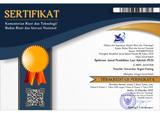The Role of Teachers in Managing Negative Emotion (Aggressive) of Early Childhood
 ),
), (1) Universitas Negeri Padang
 Corresponding Author
Corresponding Author
DOI : https://doi.org/10.24036/spektrumpls.v2i1.103663
Full Text:
 Language : en
Language : en
Abstract
The current state of affairs in early childhood is the dominant type of aggressive emotion. Negative emotions (aggressive) can arise when the child is in school, so the teacher demands a role in managing the child's emotions. The purpose of writing this article is to find out the teacher's role in managing negative (aggressive) emotions in early childhood. The design of writing this article is a literature study. The teacher's role in managing negative emotions in children is to provide warmth to children, create comfort in school, reduce the level of frustration or pressure, use storytelling methods, role play, and sociodramas that use puppets in learning, give direction to aggressive children by speaking softly - slowly use positive sentences, and provide rewards for changing aggressive behavior.
Keywords: Teacher's Role, Negative EmotionsReferences
Hazizah, N. (2018). The Importance of Playing for Developing Intelligence in Early Childhood. In Ifdil, Y. Yaswinda, Z. Ardi, & M. F. Amsal (Eds.), Proceedings of the International Conference of Early Childhood Education (ICECE 2017). Paris: Atlantis Press. https://doi.org/https://doi.org/10.2991/icece-17.2018.55
Izzaty, R. E. (2017). Perilaku Anak Prasekolah (Masalah dan Cara Menghadapinya). Jakarta: PT Gramedia.
Mashar, R. (2011). Emosi Anak Usia Dini dan Strategi Pengembangannya. Jakarta: Kencana.
Nurhafizah. (2017). Development of Naturalist Intelligence of Children in Kindergarten. In Ifdil, Y. Yaswinda, Z. Ardi, & M. F. Amsal (Eds.), Proceedings of the International Conference of Early Childhood Education (ICECE 2017). Paris: Atlantis Press. https://doi.org/https://doi.org/10.2991/icece-17.2018.5
Purwadi, Alhadi, S., & Muyana, S. (2017). Self-Regulation of Emotion as an Alternative to Reduce Student’s Aggressiveness. In N. Mariana, F. Arianto, S. Chendra, U. Zuhdi, S. Trihantoyo, B. D. Wiyono, … A. B. Dani (Eds.), Proceedings of the 1st International Conference on Education Innovation (ICEI 2017). Paris: Atlantis Press. https://doi.org/https://doi.org/10.2991/icei-17.2018.69
Soetjiningsih, C. H. (2012). Perkembangan Anak (Sejak Pembuahan Sampai dengan Kanak-kanak Akhir). Jakarta: Prenadamedia Group.
Su, S. (2018). Why Children have Aggressive Behaviors: The Influence Factor of the Gene, Parents, Peer Group and Social Media. In H. Zhou & Z. Dong (Eds.), 4th International Conference on Economics, Social Science, Arts, Education and Management Engineering (ESSAEME 2018). Paris: Atlantis Press. https://doi.org/https://doi.org/10.2991/essaeme-18.2018.39
Vitaro, F., Brendgen, M., & Barker, E. D. (2006). Subtypes of Aggressive Behaviors: A Developmental Perspective. International Journal of Behavioral Development, 30(1), 12–19. https://doi.org/10.1177/0165025406059968
 Article Metrics
Article Metrics
 Abstract Views : 400 times
Abstract Views : 400 times
 PDF Downloaded : 141 times
PDF Downloaded : 141 times
Refbacks
- There are currently no refbacks.

This work is licensed under a Creative Commons Attribution-NonCommercial 4.0 International License.



